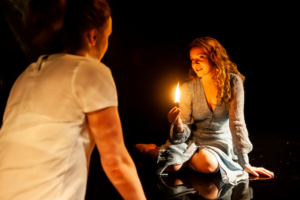Guest Blog: Playwright Zinnie Harris On MEET ME AT DAWN

The myth of Orpheus and Eurydice has always intrigued me, but particularly when I found myself suddenly grieving someone I loved very much. The story is simple: Orpheus and Eurydice are lovers, but their blissful time together is not to last. Eurydice is bitten by a snake whilst wandering in the forest and playing with the nymphs (as you do) and she dies.
Orpheus is heartbroken and (in what we would now call the 'denial phase' of grieving) sets about going into the underworld to retrieve her. He has to persuade the various monsters and ghosts that are guarding the entrance to let him - one of the living - into the world of the dead. He plays them music and charms them and is allowed to wander freely. He can't find Eurydice, though.
Hades takes pity on Orpheus and agrees that Eurydice can follow him back to the world of the living on the single condition that he walks ahead of her and doesn't turn around to see if she is there. Orpheus agrees, thinking that this sounds easy. However, it quickly becomes impossible: he isn't sure if he can hear her and thinks the gods might be playing a trick. Finally, only yards from the exit, he can bear it no longer and looks around at her, thereby condemning her to life in the underworld forever.
%2C%20Marianne%20Oldham%20(Robyn)_%20Credit%20Lidia%20Crisafulli_.jpg)
To me, it's a perfect myth because, like the best myths, it explains and dramatises some part of the human experience that we otherwise are left grappling with. Grieving is all about coming to terms with not seeing your loved one alive again, ever. And forever feels like a long time. Forever feels impossible, in fact. We rail against it, we bargain, we blame, we try to find ways that it isn't so, but it is. Death means forever. It doesn't respond to tears or threats or despair.
It's particularly tough when the death is sudden, unforeseen and - like all tragic accidents - makes no sense. When you wake up in the morning, there might be a glorious moment or two when you forget that they have gone, and in those moments you can just imagine that they have stepped into another room or the shower and will be back any second. But then you come to the present a little more and you know that that's impossible, and that you have to relive the same grief over and over again. You don't get to see them, not this morning, not tomorrow. Never.
It's the same when Orpheus is walking ahead of Eurydice. He can believe that she is still there - that she is, in fact, alive - but that belief is totally contradictory to the reality of looking around and seeing her. As soon as he looks around, she is dead. It's the ultimate paradox: she can only be alive when he is not looking.
_%20Credit%20Lidia%20Crisafulli_.jpg)
I have wanted to adapt this story for a long time, but had to grapple with how the story would work on stage; the part of the myth that I was most interested in was that single look. And that would take about two seconds of stage time! How much should one dramatise of their lives before Eurydice's death, I asked myself, and how could I tell Orpheus's story of grief without getting caught up in Gods and underworld mythology?
Finally, I started to question what would happen if that moment of the single look was expanded and became the whole play - so Orpheus doesn't just see her, but has a last chance to be with her before she is condemned to her death. What if the two lovers were given a single day to look at each other and say goodbye? Would it help them come to terms with their separation or would it, in fact, become like a nightmare?
As with all my work, I have reframed the characters in a modern context, and particularly away from the gaze of the usual gender politics of a man and woman. My Orpheus and Eurydice are two women, Helen and Robyn, who live in an ordinary house, who love each other, who have careers and mortgages and in-laws and a dog that belongs to their neighbour but is somehow theirs; two women who start a very ordinary day by getting in a boat. A boat that happens to sink.
Meet Me At Dawn at the Arcola Theatre until 9 November
Photo credit: Lidia Crisafulli
Comments

Videos

